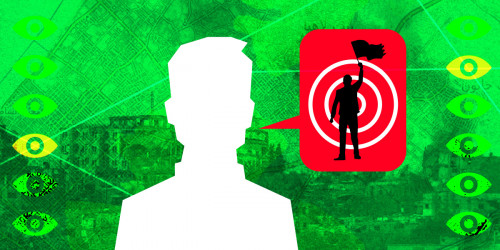The hope that filled Egypt's Internet after the 2011 January 25 uprising has long since faded away. In recent years, the country's military government has instead created a digital dystopia, pushing once-thriving political and journalism communities into closed spaces or offline, blocking dozens of websites, and arresting a large number of activists who once relied upon digital media for their work.
In the past two years, we’ve witnessed the targeting of digital rights defenders, journalists, crusaders against sexual harassment, and even poets, often on trumped-up grounds of association with a terrorist organization or “spreading false news.” Now, the government has put forward a new law that will result in its ability to target and persecute just about anyone who uses digital technology.
The new 45-article cybercrime law, named the Anti-Cyber and Information Technology Crimes law, is divided into two parts. The first part of the bill stipulates that service providers are obligated to retain user information (i.e. tracking data) in the event of a crime, whereas the second part of the bill covers a variety of cybercrimes under overly broad language (such as “threat to national security”).
Article 7 of the law, in particular, grants the state the authority to shut down Egyptian or foreign-based websites that “incite against the Egyptian state” or “threaten national security” through the use of any digital content, media, or advertising. Article 2 of the law authorizes broad surveillance capabilities, requiring telecommunications companies to retain and store users’ data for 180 days. And Article 4 explicitly enables foreign governments to obtain access to information on Egyptian citizens and does not make mention of requirements that the requesting country have substantive data protection laws.
The implications of these articles are described in detail in a piece written by the Association for Freedom of Thought and Expression (AFTE) and Access Now. In the piece, the organizations state “These laws serve to close space for civil society and deprive citizens of their rights, especially the right to freedom of expression and of association” and call for the immediate withdrawal of the law.
We agree—the law must be withdrawn. It would appear that the bill’s underlying goal is to set up legal frameworks to block undesirable websites, intimidate social media users, and solidify state control over websites. By expanding government’s power to block websites, target individuals for their speech, and surveil citizens, the Egyptian parliament is helping the already-authoritarian executive branch inch ever closer toward a goal of repressing anyone who dares speak their mind. The overly broad language contained throughout the law will lead to the persecution of individuals who engage in online speech and create an atmosphere of self-censorship, as others shy away from using language that may be perceived as threatening to the government.
The Egyptian law comes at a time of increased repression throughout the Middle East. In the wake of the 2011 uprisings, a number of countries in the region began to crack down on online speech, implementing cybercrime-related laws that utilize broad language to ensure that anyone who steps out of line can be punished.
In a 2015 piece for the Committee to Protect Journalists, Courtney Radsch wrote: “Cybercrime legislation, publicly justified as a means of preventing terrorism and protecting children, is a growing concern for journalists because the laws are also used to restrict legitimate speech, especially when it is critical or embarrassing to authorities.”
A June 2018 report from the Gulf Center for Human Rights maps both legal frameworks and violations of freedom of expression in the six Gulf states, as well as Jordan, Syria, and Lebanon, noting that “The general trend for prosecution was that digital rights and freedoms were penalised and ruled as 'cybercrime' cases delegated to general courts. Verdicts in these cases have been either based on an existing penal code where cybercrime laws are absent, in the process of being drafted, or under the penal code and a cybercrime law.”
These are difficult times for free expression in the region. EFF continues to monitor the development of cybercrime and other relevant laws and offers our support to the many organizations in the region fighting back against these draconian laws.









